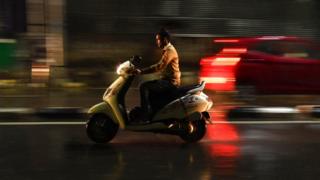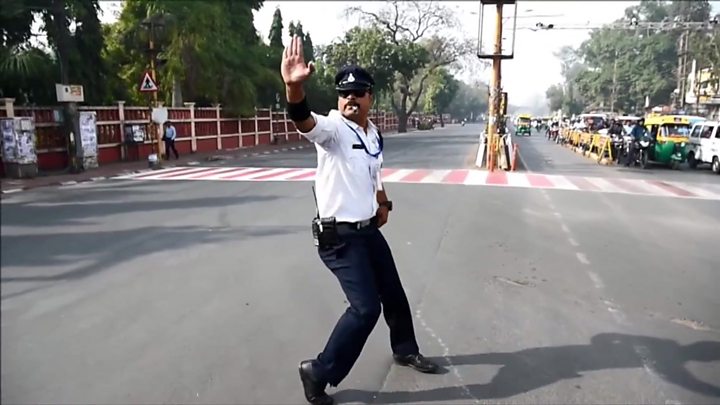The city where motorbike riders hate helmets
Wearing helmets is mandatory for motorbike riders in India. But political interference has made it difficult for police to enforce the law in the western city of Pune, writes independent journalist Omkar Khandekar.
From the sidelines of the noisy Ganeshkhind road in Pune, police constable Sunil Tathe looks at the oncoming traffic with disappointment.
“Up to 70% motorcyclists in the city wore helmets until recently. But ever since we received orders to stop the helmet-enforcement drive, I barely see half of them wearing it,” he says.
Mr Tathe is referring to a recent government order which stops police from questioning riders who violate the law.
Devendra Fadnavis, the chief minister of Maharashtra state (where Pune is located), told the city police to send notices of fine to offenders’ homes instead of stopping them on the road. He gave the order after Pune’s legislators accused the police of harassing people because of the helmet-enforcement drive.
Police across India struggle to enforce the law as riders often don’t wear a helmet. The problem is more severe in smaller towns.
That’s why police in Pune launched the drive to stop and fine offenders on the spot. They believe that sending notices is not as effective.
Read more India stories
“You can only penalise someone if their number plate is visible in the CCTV,” said Tathe. “I’ve often come across people who hide or rub off a digit on the number plate. When asked, they say an errant child did it.”
Pune has one of the highest numbers of two-wheelers in the country – nearly 2.5 million – and ranks among the top 10 Indian cities for fatal road accidents.
In the last five years, more than 1,000 bikers died on Pune’s roads and in the suburban Pimpri-Chinchwad area. Only three of the deceased were wearing helmets.
And yet, when the city police declared their intent to strictly enforce the law this year, many residents were outraged.
Some took to the streets and held rallies, chanting slogans such as “helmet hatao, Punekar bachao” (get rid of helmets, save Pune’s residents). One “anti-helmet group” even went to a crematorium and staged a mock funeral of helmets.
They argue that people from the Sikh faith, most of whom wear turbans, are exempted from wearing helmets, so why should they not have the freedom to choose? A local politician, who supported the protests, claimed helmets cause problems in the spine.
Vivek Velankar, who heads the “anti-helmet compulsion action committee”, says that their battle has been going on for nearly two decades. Bikers in Pune, he adds, have to ride carefully anyway, considering how congested the city is.
“Wearing helmets, in fact, makes bikers feel a degree of safety,” he says. “That makes them even more reckless.”
One political party organised a motorbike rally where all riders wore the traditional Pune headgear made of cloth, instead of helmets.
And in April, just before the parliamentary elections, advocate Ramesh Dharmavat, a candidate from the fledgling People’s Union Party, contested on the sole issue of banning helmets. He received 547 votes.
Anil Deshmukh, deputy commissioner of Pune traffic police, says most people argue against wearing helmets, which frustrates officers who are enforcing the law.
“There just doesn’t seem to be any logical explanation for such arguments. But here (Pune), they also get political patronage,” he says.
The drive had begun on 1 January and police had fined more than 100,000 people for riding without helmets in the first three months. Even as a section of the city’s population resisted, says Mr Deshmukh, the compliance was around 80% in some areas.
The police also launched a scheme to reward citizens who had no traffic violations on their record. They were given discount coupons to be redeemed at restaurants or shops.
But this changed once police started implementing the chief minister’s order.
They don’t have the manpower or necessary technology, such as a synchronised signalling system or cameras that automatically recognise number plates.
Nishad Kulkarni, an architect and long-time city resident, says the resistance largely stems from Pune’s history.
“In the 1980s and early 1990s, Pune used to be a city of cyclists. You would frequently use cycles to commute. But that changed in the late 1990s. As the manufacturing and IT boom started, several infrastructure projects and skyscrapers came up. Soon, everyone was driving cars or riding motorbikes before knowing how to behave on roads,” he says.
Many of the city’s residents, according to him, prioritise convenience over safety. “Whenever I’ve seen cops stop these people, they think they know better.
It takes one to know one. “There are 30 people in my own family. I don’t think any one of us wears a helmet,” he says.
Source: Read Full Article




